A major takeaway of the first phase of this yearlong study was that partisan dynamics are the strongest factor in Americans’ trust in the news media and other related concepts. The findings here reinforce that conclusion: Republicans, and especially strong Trump supporters, consistently express more negative sentiments about the news media.
There are a few places, though, where there is somewhat more agreement, including opinions about whether the news media should be approached with skepticism, perceptions of whether confidence in the institution can increase, and important factors that draw people to their key sources of news.
Republicans are more negative than Democrats in views of the news media’s role in society
Across a range of attitudes toward the news media, Republicans and those who lean toward the Republican Party are far more negative than Democrats and Democratic leaners, including in their levels of confidence in the media, their perceptions of how transparent news outlets are, and their views about the role and impact of news organizations in America.6
Republicans are far less likely to think the American public has confidence in the news media, and they have a lower level of confidence themselves that journalists act in the best interest of the public. Additionally, Republicans tend to think that news organizations are not transparent with their audiences in many ways – though most Democrats also feel news outlets do an insufficient job explaining where their money comes from.
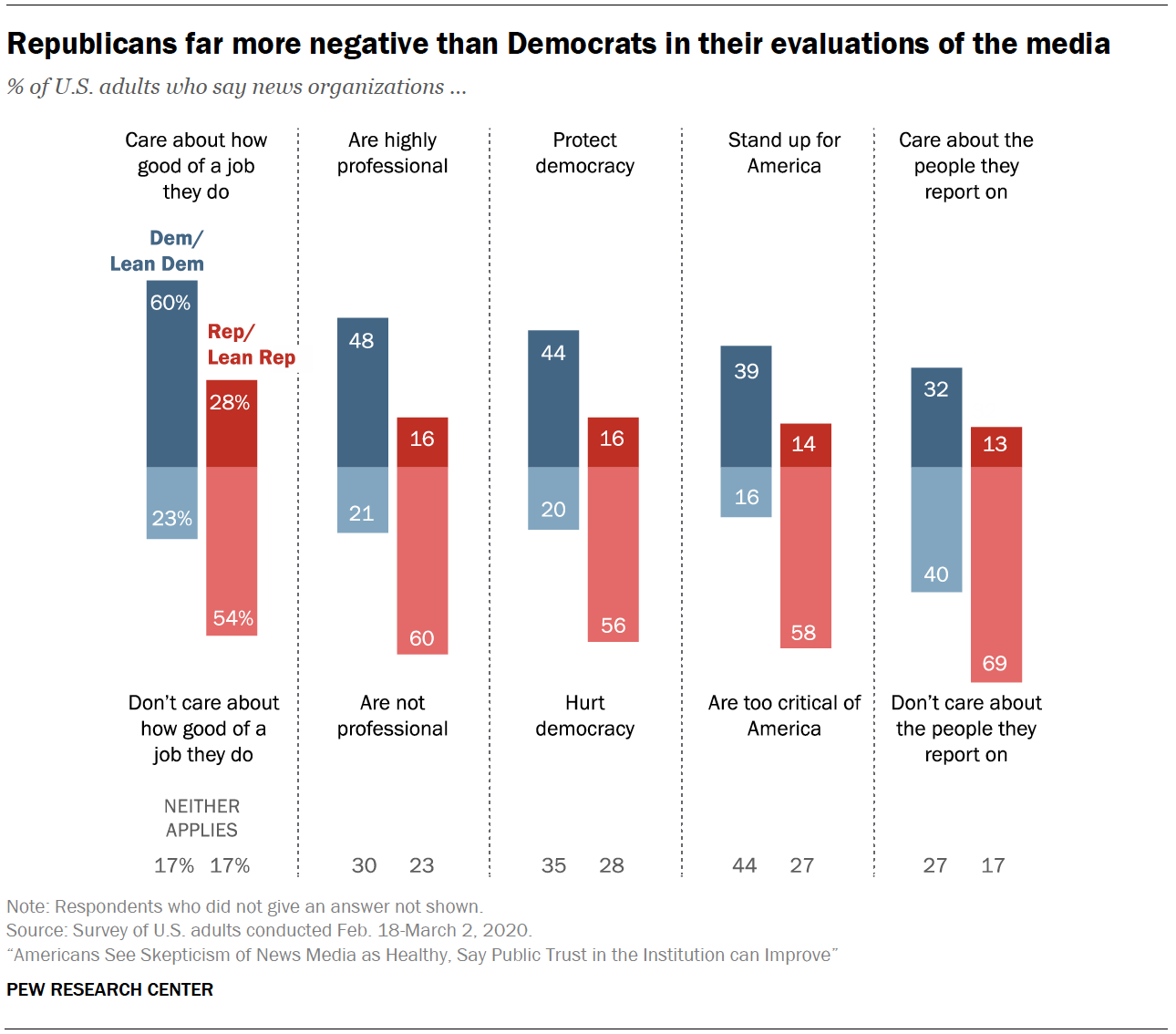
There also are large partisan divides in views of the role news organizations play in society, as well as of their professional standards. When asked to evaluate news organizations along five dimensions, Republicans are less likely than Democrats to hold a positive view in all five areas.
For example, six-in-ten Democrats say the news media care about how good of a job they do, compared with 28% of Republicans who say the same. And nearly seven-in-ten Republicans (69%) say journalists do not care about the people they report on. Democrats are far less negative in this way, although they also are more likely to say news organizations do not care about those they cover (40%) rather than that they do care (32%).
Republicans far more likely than Democrats to think that mistakes in news reports happen because of an intention to mislead audiences
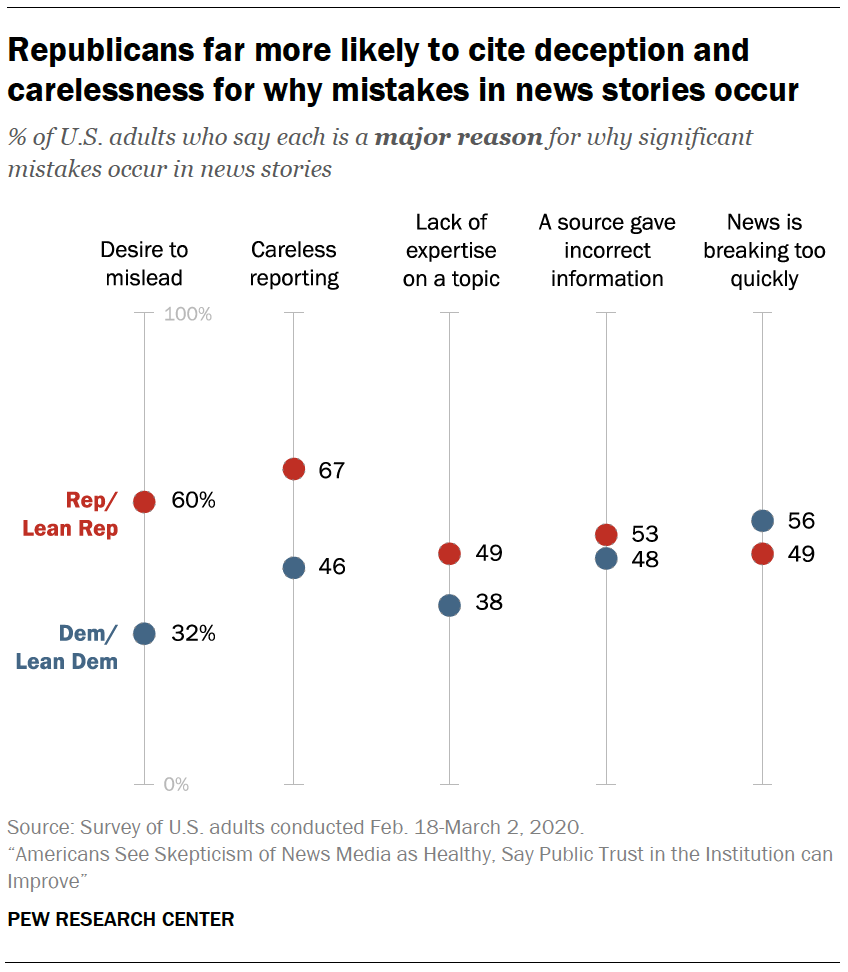 Much more so than Democrats, many Republicans generally go into news stories expecting they will be inaccurate. But they also go a step further: There is a deep sense among Republicans that ill will leads to mistakes in news stories.
Much more so than Democrats, many Republicans generally go into news stories expecting they will be inaccurate. But they also go a step further: There is a deep sense among Republicans that ill will leads to mistakes in news stories.
Republicans are about twice as likely as Democrats to say that a major reason significant mistakes happen in news stories is that there is a desire to mislead audiences (60% vs. 32%). And about two-thirds of Republicans (67%) say careless reporting is a major reason, compared with 46% of Democrats. Republicans also are modestly more likely to say that lack of expertise and incorrect information from sources are major reasons for errors in news stories.
Quote from focus group:
“I don’t know. A lot of times they lie. To me, they lie a lot. And they don’t tell the truth when I watch them.” – Republican woman, 53
But Democrats are somewhat more likely than Republicans to cite one possible reason for errors, one that is less of an indictment of journalists’ own work: More than half of Democrats (56%) say the fast pace of breaking news is a major reason why significant mistakes happen in news stories, 7 percentage points higher than Republicans (49%).
Majorities in both parties see the benefit of approaching the news media with some level of skepticism
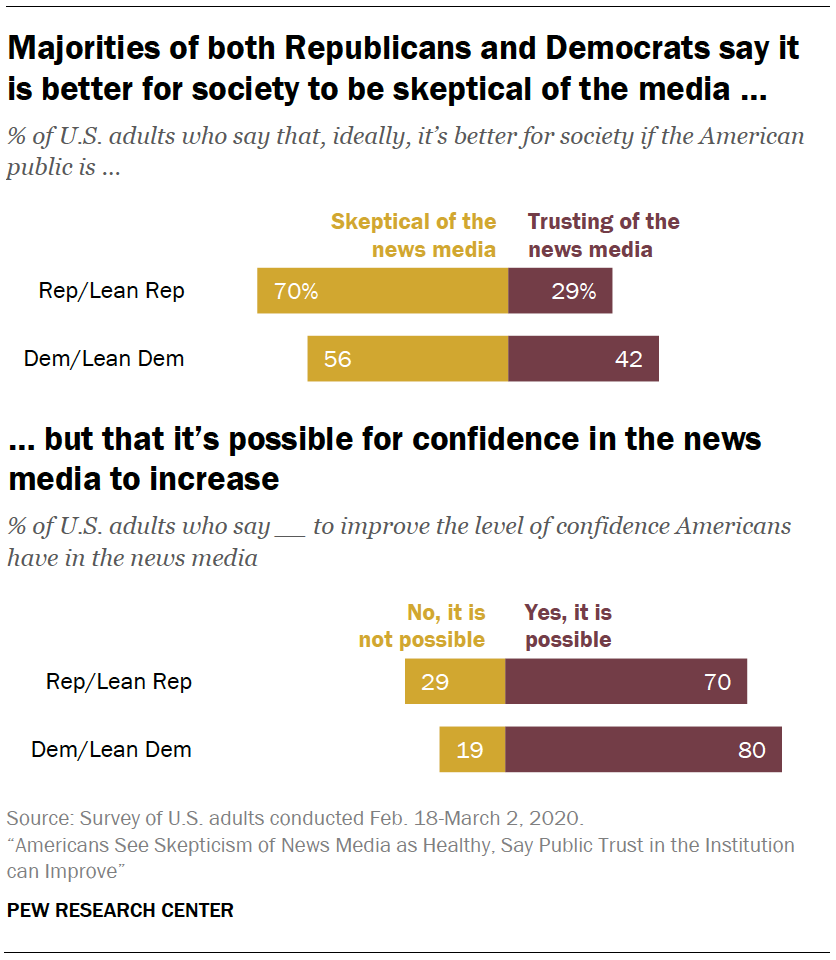 Despite a long list of divides between the two major parties in their views toward the news media, there are a few places where Republicans and Democrats are more likely to see eye to eye.
Despite a long list of divides between the two major parties in their views toward the news media, there are a few places where Republicans and Democrats are more likely to see eye to eye.
Seven-in-ten Republicans say that, in an ideal world, it would be better for society if the public is skeptical of the news media (rather than trusting). Most Democrats – albeit a smaller majority (56%) – also say that skepticism toward the news media is better than trust.
At the same time, large majorities of both parties feel that the public’s confidence in the news media could improve in the future. Eight-in-ten Democrats say it is possible for this to happen, as do seven-in-ten Republicans.
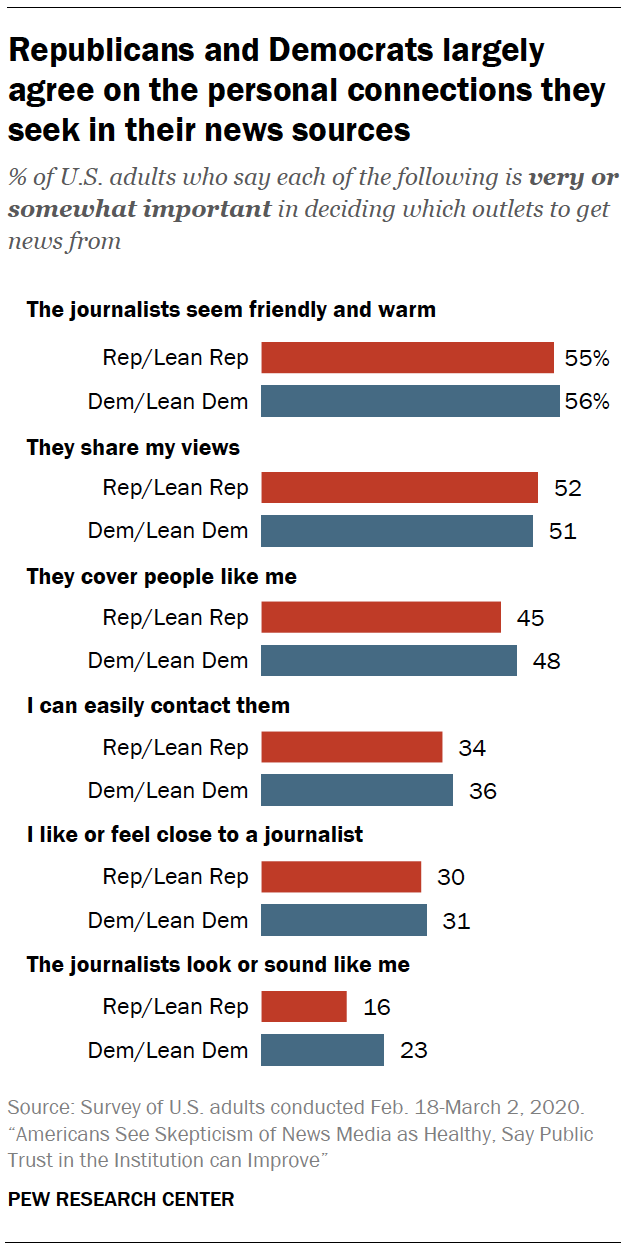 Republicans and Democrats also navigate the news environment in very similar ways. Members of the two parties hardly differ from each other, if at all, in thinking that six different aspects of how news organizations connect with their audiences are important in deciding where to get their news. For example, 56% of Democrats and a nearly identical share of Republicans (55%) say it is at least somewhat important for journalists at a news outlet to be warm and friendly. And about half of both groups say that it is important that the source shares their views. Democrats are slightly more likely to say that it is very or somewhat important that the journalists at a particular news outlet look or sound like them (23%, vs. 16% of Republicans), in part because Black and Hispanic Americans – who make up a larger share of the Democratic Party – are more likely to take this position (see Chapter 5).
Republicans and Democrats also navigate the news environment in very similar ways. Members of the two parties hardly differ from each other, if at all, in thinking that six different aspects of how news organizations connect with their audiences are important in deciding where to get their news. For example, 56% of Democrats and a nearly identical share of Republicans (55%) say it is at least somewhat important for journalists at a news outlet to be warm and friendly. And about half of both groups say that it is important that the source shares their views. Democrats are slightly more likely to say that it is very or somewhat important that the journalists at a particular news outlet look or sound like them (23%, vs. 16% of Republicans), in part because Black and Hispanic Americans – who make up a larger share of the Democratic Party – are more likely to take this position (see Chapter 5).
Support for Trump connects with views of the news media, particularly within the Republican Party
Another major takeaway of the first phase of this study is that Americans’ views of the news media closely tie to their views of Donald Trump – within and across the parties. Trump’s strongest Republican supporters view the news media more negatively than other Republicans. Similarly, there are some divides within the Democratic Party based on the intensity of their feelings toward Trump, who often clashes with the news media. In a survey conducted Jan. 6-20, 2020, 64% of Republicans said they strongly approve of how Trump is handling his job as president. The remaining Republicans were split between those who said they approve of Trump somewhat (16%) and those who disapprove either strongly or somewhat (18%). The vast majority of Democrats (92%) disapproved of the job Trump was doing at the time, including 79% who strongly disapproved.7
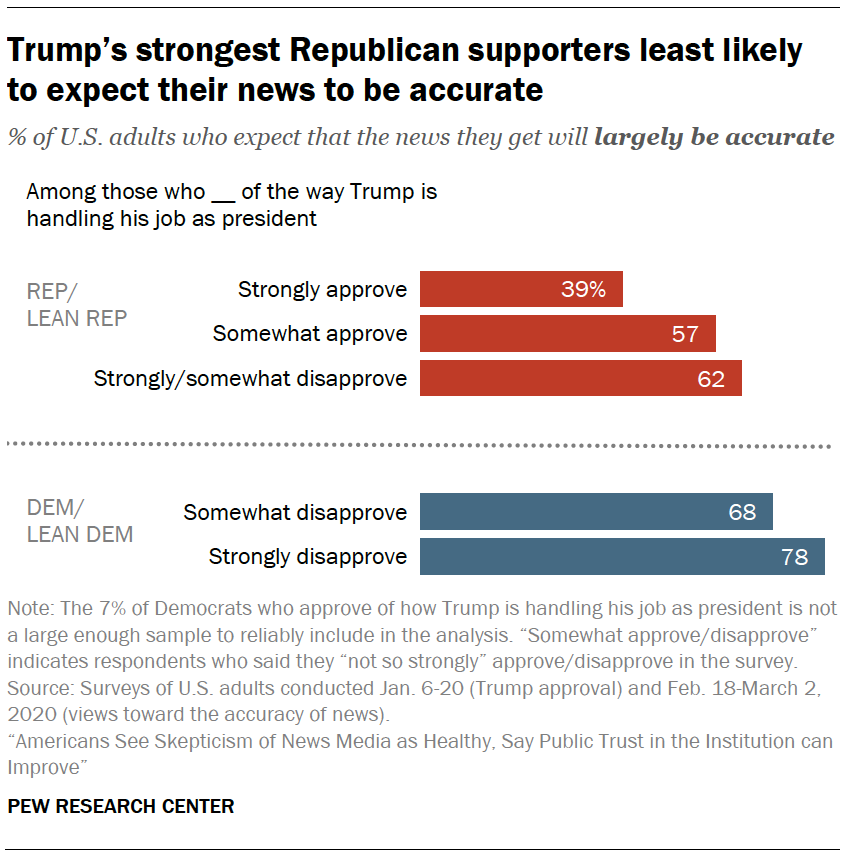 One place in which there is a clear relationship between attitudes toward the media and strong approval of Trump is in opinions about the accuracy of news. Not only do Republicans and Democrats overall differ dramatically in whether they expect the news to be accurate, but Republicans who strongly approve of Trump are much less likely than other Republicans to expect accurate reporting.
One place in which there is a clear relationship between attitudes toward the media and strong approval of Trump is in opinions about the accuracy of news. Not only do Republicans and Democrats overall differ dramatically in whether they expect the news to be accurate, but Republicans who strongly approve of Trump are much less likely than other Republicans to expect accurate reporting.
Roughly four-in-ten Republicans who strongly approve of Trump (39%) expect the news they get will largely be accurate, compared with 57% of Republicans who approve of Trump somewhat and 62% of those who disapprove of the president.
There are not enough Democrats who approve of Trump in the survey to analyze them separately. But there is still a difference within Democrats on this question: 78% of Democrats who strongly disapprove of Trump generally expect news to be accurate, while a smaller majority of those who disapprove of the president somewhat (68%) say the same.
Clear differences also exist in why people think errors occur in news coverage – particularly within the GOP. Republicans who strongly support Trump are more likely than other Republicans to say mistakes in news stories stem from malintent or carelessness. One of the most commonly named reasons for inaccurate reporting among Trump’s most approving Republicans is that there is an intention to mislead. About two-thirds (67%) say this is a major reason why significant mistakes occur; fewer Republicans who somewhat approve of Trump (50%) or disapprove of him (38%) share this view. And about a third of Democrats (32%) – among both those who strongly and somewhat disapprove of Trump – say an intention to mislead is a major reason for errors in news stories.
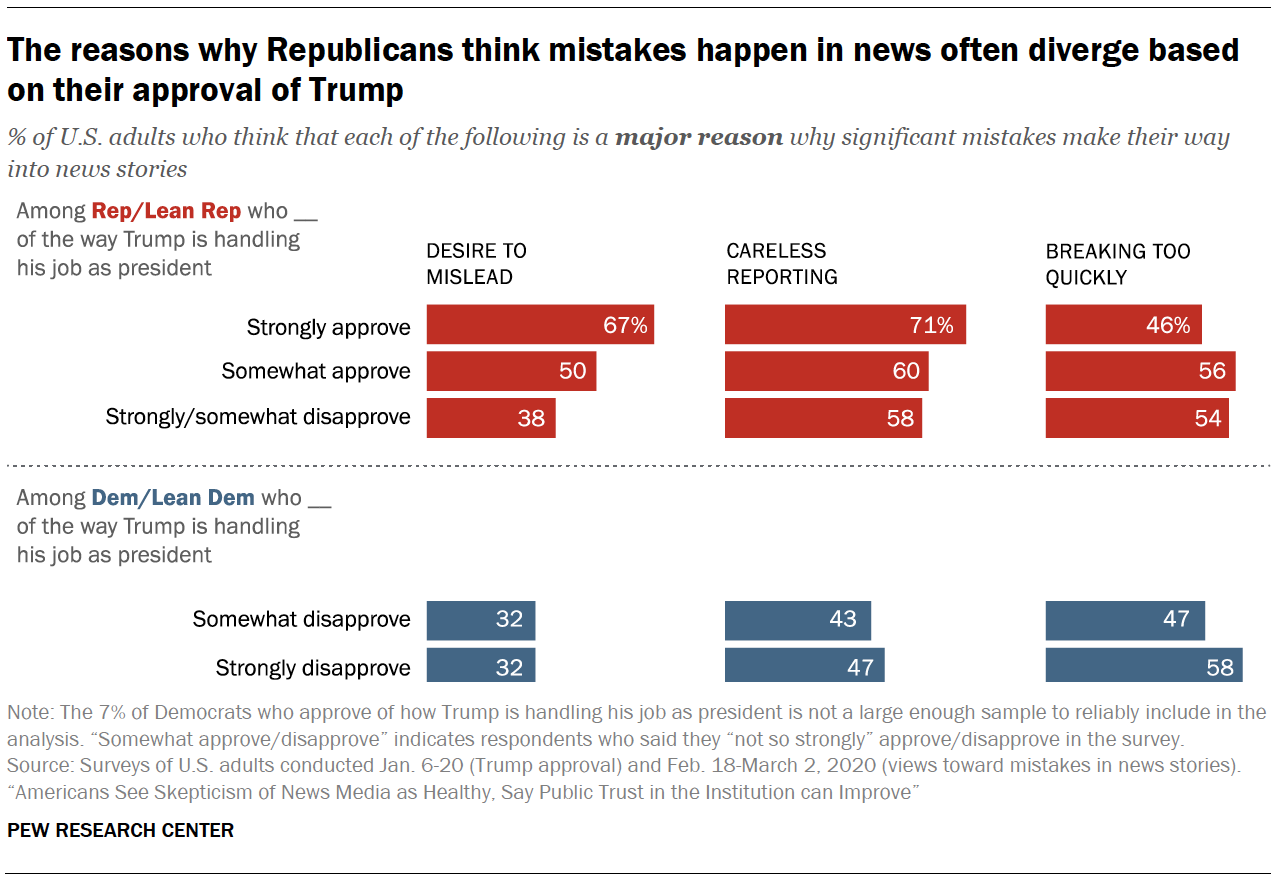
Republicans who are very supportive of Trump also are somewhat more likely than those who are less supportive to say that carelessness is a major reason for errors in news stories, though majorities of all Republican groups take this position. Conversely, those who are less supportive of Trump (among both Republicans and Democrats) are more likely to say the fast pace of breaking news is a major reason for mistakes in reporting.
A similar pattern exists within the GOP on a number of other opinions about the news media, such as views of the public’s confidence in the institution. While roughly a quarter of Republicans (24%) who strongly approve of Trump say the public has a “great deal” or “fair amount” of confidence in the news media, this rises to 37% among Republicans who approve of Trump somewhat and nearly half of those who disapprove of him (47%). About six-in-ten Democrats who strongly disapprove (58%) or somewhat disapprove (59%) of Trump say the same.
Previous findings from the yearlong study show the same relationship across a number of attitudes related to trust in the news media, including views of journalists’ ethics, trust in the information from national news organizations and perceptions of the news media’s watchdog role.


